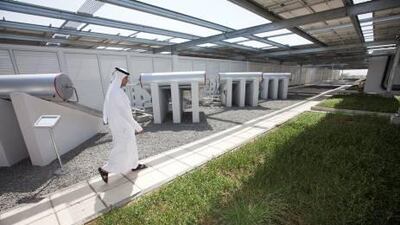Developers seeking accreditation under an international system to evaluate green buildings will soon be required to install meters to monitor energy and water use.
Revisions to Leed (Leadership in Energy and Environmental Design), an initiative of the US Green Building Council to evaluate green projects, will require developers to fulfil four new conditions starting from November this year.
Two of these require developers to install meters to measure the energy and water use of buildings. Such meters were previously optional.
Developers will also be required to employ strategies to reduce outdoor water use, and separate at site the waste generated during construction and send it for recycling.
The Leed system, used worldwide, is popular in the UAE, especially in Dubai, while buildings in Abu Dhabi mostly rely on Estidama, the emirate's own rating system developed by the Urban Planning Council.
A document detailing revisions to the Leed system, referred to as Leed v4, is publicly available, according to Mario Senevirtane, director of Green Technologies, a Dubai engineering consultancy.
"The core of it [the system] has not changed," said Mr Senevirtane, who helped to develop the system in the late 1990s and teaches engineers from the region how to integrate it into their designs.
In the UAE, Mr Senevirtane has worked on many green projects, many pursuing Leed certification. One of the most recent is the new service centre of the Dubai Electricity and Water Authority in Al Quoz.
The building was awarded platinum, the highest of four classifications under Leed, and has more points - 98 - than any other project in the region under the system.
The maximum number of points the system can award is 110.
Of the new requirements to install metering devices, Mr Senevirtane said that doing so cost relatively little for developers, but could lead to significant savings of energy and water.
"If you are trying to improve something, then you need to know where you are at," he said.
The issue of metering is particularly important in the UAE, he said, as "there are large buildings in Dubai that are metered jointly or that have no meters at all".
For developers who want to go the extra mile, Mr Senevirtane recommends not only measuring a building's overall energy and consumption but also measuring the energy required for cooling, lighting and other uses, as well as the water required for domestic, irrigation and for cooling towers.
"The new version takes into consideration everything we have learnt in the past years," said Mr Senevirtane.
"They are obviously trying to make the system more user-friendly and more effective."
vtodorova@thenational.ae

Green buildings guide to put emphasis on energy metering for UAE developers
The new version of LEED, the rating system used to evaluate green buildings worldwide, will put a greater emphasis on metering energy and water use in buildings.
Most popular today
